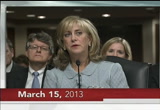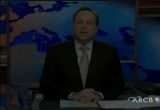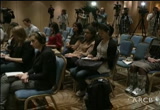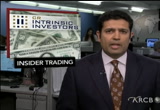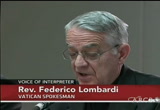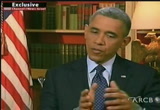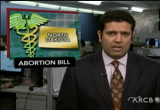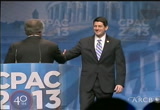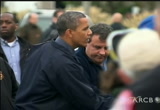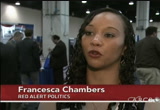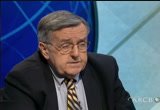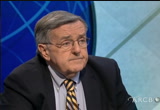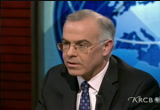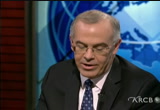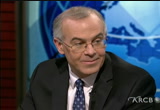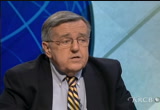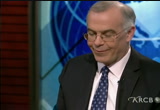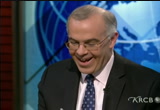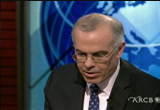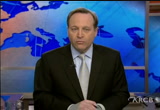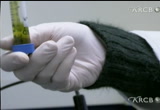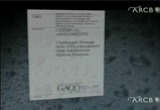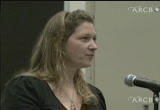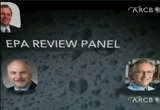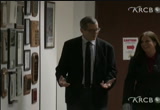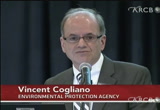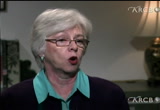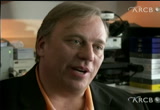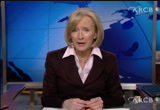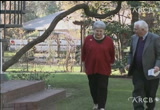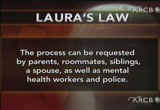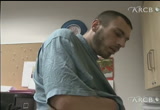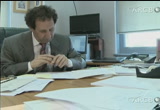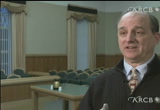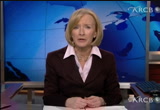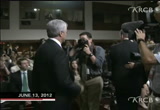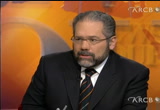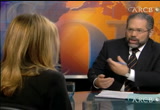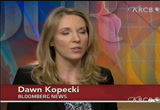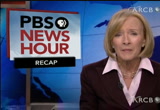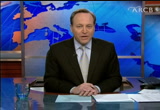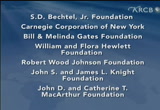tv PBS News Hour PBS March 15, 2013 5:30pm-6:30pm PDT
5:32 pm
captioning sponsored by macneil/lehrer productions >> woodruff: rebels in syria said today they would not stop fighting until president bashar al-assad is gone. good evening, i'm judy woodruff. >> brown: and i'm jeffrey brown. on the "newshour" tonight: two years into the syrian uprising, we look at the situation on the
5:33 pm
ground, and the diplomatic debate over aiding the rebels. >> woodruff: kwame holman reports from the annual gathering of american conservative activists, who are trying tchartheir political future. >> with last november's defeat of mitt romney, this key bloc of conservative enthusiasts has set its sights on a new goal: reshaping and re-energizing the republican party. >> brown: mark shields and david brooks analyze the week's news. >> woodruff: miles o'brien continues his investigation into drinking water contaminated with chromium six and the regulators responsible for cleaning it up. >> yeah, it causes cancer. that's the biggest health concern. >> we know that for sure. >> there's no doubt about it. it's considered a human carcinogen by all the major regulatory agencies in the world. >> brown: and we close with today's congressional testimony by the woman who headed j.p. morgan's risk unit about a billion dollar trading error. >> woodruff: that's all ahead on tonight's "newshour." >> major funding for the pbs newshour has been provided by:
5:34 pm
>> support also comes from carnegie corporation of new york, a foundation created to do what andrew carnegie called "real and permanent good." celebrating 100 years of philanthropy at carnegie.org. >> and with the ongoing support of these institutions and foundations. and... >> this program was made possible by the corporation for public broadcasting. and by contributions to your pbs station from viewers like you. thank you. >> brown: syria marked a new milestone of misery today-- the second anniversary of protests that exploded into civil war. but there was no prospect of new peace efforts, even as the numbers of dead and displaced
5:35 pm
continued to climb. more fighting marked the two years since the uprising began against syrian president bashar al-assad with no end in sight. a general for the free syrian army-- speaking from an undisclosed location-- vowed to press on. >> i know our battle is not so easy. we have to fight against planes, we will not stop until this criminal regime has gone. demonstration against the >> brown: it began with a demonstration against the government, during the arab spring of 2011. the spark came in the southern city of daraa, where security forces beat a group of teen-age boys. their crime: scrawling anti- assad slogans on their school wall. from there, the protests spread, the regime cracked down violently, and fighting erupted. it's since grown into a full- blown civil war, with the rebels seizing large chunks of territory. in all, more than 70,000 syrians have died.
5:36 pm
russia-- its warships seen today docking in beirut before moving on to syria-- continues to supply arms to the syrian military. other nations have called on assad to step down, but been reluctant to intercede. today in brussels the european union rejected a push to lift its embargo on arms to the rebels, over the objections of france and britain. >> assad is still in place, he is still being strongly supplied and strengthened by others and we need to put pressure on to bring about the transition that is necessary for the syrian people, necessary for the stability of that region and in our national interest, too. >> brown: last month, the u.s. announced it would for the first time provide food and other non- lethal aid directly to the rebels. but the obama administration has held back from sending weapons, citing the influx of foreign extremists into rebel ranks. the president could confront questions about that policy when he visits the middle east next week, with stops in israel, the west bank and jordan.
5:37 pm
>> time is of the essence here. >> brown: frederic hof, formerly the president's special advisor for transition in syria, is now at the atlantic council, a washington think tank. >> it is probably time for the united states and its allies to engage directly in strong relationships with these armed rebels, the ones we've been able to vet, the ones who share our basic values. some of those relationships may involve arming. >> brown: the u.s. and others also face the challenge of helping more than a million syrns who have fled to surrounding lebanon, turkey, jordan and iraq. even more are displaced inside syria. today, in beirut, lebanon, the u.n.'s high commissioner on refugees warned, again, of ripple effects. >> the syrian conflict is more than a humanitarian tragedy, the syrian conflict became a meaningful threat to regional and global peace and security.
5:38 pm
there is a real risk of seeing the syrian conflict spilling over. >> brown: and also today, as if to bring home that point, syria's foreign minister warned his government may launch attacks on rebel safe havens inside lebanon. >> woodruff: still to come on the "newshour": conservatives regroup; shields and brooks; contaminated water and the e.p.a. and j.p. morgan in the hot seat. but first, the other news of the day. here's hari sreenivasan. >> sreenivasan: the securities and exchange commission says it has reached the largest insider trading settlement ever. under the deal announced today, the hedge fund c.r. intrinsic investors will pay more than $600 million. it will not admit or deny any wrongdoing. regulators charged that one of the fund's managers illegally made trades on an alzheimer's drug, based on confidential test results. there was word today that u.s. senator robert menendez of new jersey is under investigation by a federal grand jury in miami.
5:39 pm
"the washington post" reported the panel is looking into his role in advocating for the business interests of a wealthy donor. the veteran democrat has already reimbursed the government for two flights he took aboard the donor's private jet. in a statent, his office said s acons have aays en appropate. the vatican is attacking claims that pope francis never confronted a brutal military dictatorship that ruled argentina from 1976 to 1983. some human rights activists say the former jorge mario bergoglio acquiesced in the face of torture and murder. but a vatican spokesman lashed out today at the allegations, calling them a defamatory, left- wing campaign. >> ( translated ): the anti- clerical accusations against bergoglio are known and obvious. they refer to a time when he wasn't yet a bishop, but a jeuit superior in argentina. it concerns two priests who were kidnapped and he allegedly did not protect. there has never been a concrete and credible accusation made towards him.
5:40 pm
he denied the accusations and provided proper documentation to support him. >> sreenivasan: francis is due to be installed as pope next tuesday. the head of a u.n. investigating team charged today that u.s. drone strikes in pakistan violate the country's sovereignty. the official said the pakistani government told him it does not consent to the strikes, something u.s. officials have disputed. president obama has stepped up c.i.a. drone strikes in pakistan's tribal region since 2009. the pakistani government says it has confirmed at least 400 civilian deaths. president obama has put a new timeline on iran's progress toward building a nuclear weapon a little over a year. but, he says the u.s. has significant capabilities to prevent that from happening. he spoke in an interview that aired on israeli television last night, ahead of his middle east trip next week.
5:41 pm
>> we think that it would take over a year or so for iran to develop a nuclear weapon, but obviously we don't want to cut it to close, and what we're going to be doing is to continue to engage internationally with iran, understanding that we've set up the toughest sanctions ever, it's having an effect. >> sreenivasan: iran maintains its nuclear program is solely for peaceful purposes. it was energy of a different kind that took the president to illinois today. he called for cars that go coast to coast without gasoline. mr. obama toured the argonne national laboratory outside chicago and talked up his proposal for new auto research. the focus would be on bio-fuels and better batteries for electric cars. the president wants congress to authorize $2 billion over the next decade for the research. north dakota may become the first state to ban abortions as soon as a fetal heartbeat is detected. that could be as early as six weeks after conception. the state senate approved the ban today and sent it to republican governor jack dalyrymple. he opposes abortion, but has not said whether he would sign the bill into law. gay marriage has picked up a
5:42 pm
pminent new supporter, senator roportmaofhio. it makes him t onlrepublican in the u.s. senate to take that position. portman explained his change of heart in "the columbus dispatch". he said it began two years ago, when his college-age son told his family that he is gay. wall street backed up a bit as the week ended. that ended a ten-day winning streak by the dow jones industrial average-- its longest in 17 years. the dow industrial average lost 25 points to close at 14,514. the nasdaq fell nearly 10 points to close at 3,249. for the week, the dow gained ju under 1%. the nasdaq rose a tenth of a percent. those are some of the day's major stories. now, back to judy. >> woodruff: thousands of activists gathered this week for one of the conservative movement's biggest events. "newshour" congressional corresspondent kwame holman was there. >> reporter: for four decades the conservative political action conference known as "c- pac" has served as a barometer for republican politics. and this year, the g.o.p.'s future direction is the issue for more than 10,000 delegates
5:43 pm
who've been meeting just outside washington. at the last few gatherings of c- pac, the focus was on taking back the white house from president obama. but with last november's defeat of mitt romney, this key bloc of conservative enthusiasts has set its sights on a new goal: reshaping and reenergizing the republican party. romney offered his own assessment today, in his first public address since his concession speech on election night. >> each of us in our own way is going to have to step up and meet our responsibilities. i'm sorry i won't be your president, but i will be your co-worker and i'll work shoulder-to-shoulder alongside you. ( applause ) >> reporter: romney may be stepping away from the stage, but his running mate wisconsin congressman paul ryan is back in the thick of fiscal fights on capitol hill. today, he addressed the deficit. >> by living beyond our means, government is sending us a message.
5:44 pm
it is saying, if you plan ahead, if you make sacrifices for your kids, if you save, you're a sucker. it is brazenly stealing from our children and our young adults and it has to stop. >> reporter: amid the stickers, tchotchkes and people in costume, the conference also showcased other rising republican stars, calling for a fresh approach. kentucky senator rand paul is a tea party favorite mulling a 2016 presidential bid. fresh from an attention-getting filibuster, he warned conservatives must stand on principle if they are to win nationally. >> the g.o.p. of old has grown stale and moss-covered. i on't think we need to name any names here, do we? our party is encumbered by an inconsistent approach to freedom.
5:45 pm
the new g.o.p., the g.o.p. that will win again, will need to embrace liberty in both the economic and personal sphere. >> reporter: florida senator marco rubio tailored his message to addressing the everyday concerns of middle-class americans. >> our people have not changed. the vast majority of the american people are hard-working taxpayers who take responsibility for their families, go to work everyday, they pay their mortgage on time, they volunteer in the community. this is what the vast majority of the american people still are. >> reporter: those not invited to speak illustrated the divisions in conservative ranks between tea party adherents and traditionalists. new jersey governor chris christie was excluded after he praised president obama's handling of superstorm sandy last fall. and then, criticized congressional republicans for blocking emergency disaster funding. also snubbed was virginia governor bob mcdonnell, who is raising taxes to pay for a transportation plan in his
5:46 pm
state. all of which leaves conservatives facing a key question: how to unify behind a central message that moves the republican party forward? veteran republican pollster whit ayres says it will take more than tinkering. >> it is delusional to think that we had the right message and we just haven't communicated it effectively. you don't lose five of the last six presidential elections in the popular vote if you have got the right message. so we need new message, new messengers and a new tone. >> reporter: francesca chambers is editor of the conservative blog "red alert politics." she says the effort must involve more outreach to young people and minorities, but she acknowledges that will take time. >> that is not necessarily going to happen in three months time. i think that it's unfair to say, "oh, the election was in november and we don't see big changes, sweeping changes happening yet." i think that everyone needs some time to make these things happen and we have got four years to make that happen. >> reporter: in the meantime, even as c-pac delegates focus on
5:47 pm
the next generation of conservatives, they're also listening to voices that were prominent in the past. the list includes 2008 vice presidential nominee sarah palin and former house speaker newt gingrich, both scheduled to address the conference tomorrow. >> woodruff: and to the analysis of shields and brooks, syndicated columnist mark shields and new york times columnist david brooks. good to see you both. >> thank you. >> woodruff: so mark, looking at the cpac conference, what a way to make the republican party he nservative movement. >> well first a indication rea note. the cpac is not representative of the republican party by any means. the poll in the past in presidential candidates is elected president, giuliani -- president steve forbes and president ron paul. just outside of the mainstream.
5:48 pm
but i think the republican put his finger on it when he said the republican have lost five of the last six presidential elections popular vote. that obviously includes the 2000. and judy, the most revealing thin to me was the response that ryan paul got. he was the rock star of this gathering. in part it's because i think the discid over the last 12 years republican foreign policy game plan which is let's go in first and ask questions later, has been really undermined and sabotaged by both the american experience in iraq and the american experience in afghanistan. there's been a long tradition of the republican party but i think there's now a reluctance a caution that hasn't been there in the past about foreign intervention. >> woodruff: ron paul has struck a chord. >> he has at the moment.
5:49 pm
this is american leadership in the role believes america has an important role to play as a world leader including global order, free trade, free water ways, free commerce. that happens because of u.s. military. the idea of the party is not going to be that party. it happen. in the 19 20's the party shifted. for them to go back i have to sate. right now the move from the president of the other party, move intervention, move os tear taught, war exhaustion. when there's a threat from iran i still believe the republican party is a defense party and interveneionist party. he is leading the party one way, marco rubio is leading another. as we hit sheer has not hour and-a-half jeb bush will give a speech which is the -- meaning -- he's reformist in one
5:50 pm
way. let's pull back. marco rubio said something to me phenomenally stupid we don't need new ideas. that's never a good thing to say but nonetheless he's more mainstream than moderate. jeb bush is pushing the other direction we really got to change our message for the poor and working class. you're beginning to see the splits even though the cpac. >> jeb bush, it's interesting he hasn't won an election since 2002 and his rustiness was on display when he had to change his position three times in the space of 24 hours on immigration. he wrote a book about it and he had to move away from his own book before the book was basically autographed. i mean so i agree with you, he had credentials going in but it's been a long time. this is a tough sport, politics is a contact sport. jack -- was fond of saying it ain'tean bag and i think the
5:51 pm
question of accepted. >> woodruff: you agree with mark's initial call this is not representative of most republicans. they had the most prominent republican speaking. >> people show up to this event. it's become an event where people show up every year. you can never measure anything by what they're applauding because this is a group that's one wing of the party, a more hard core, probably more mill tainer, older and college kids. so this is not the publican party. so michele bachmann is fine with this group, sarah palin fine, those people are not nominated. don't measure the audience pay attention to the speeches. >> i would just add this. that any group that doesn't invite chris christie, the most popular politician in the country let alone the republican politician, bob mcdonald, governor of virginia who had showed bipartisan skill in getting transportation bill through, major plan that required raising taxes.
5:52 pm
and instead invites documented trump. you have to question the seriousness and where it is on the political compass. >> woodruff: talking about the president he continued david this week, this charm offensive outreach to congress. why is he doing this and does it look like it's working? >> so why he's doing it. a simple explanation which i would never stoop to is he's a little down in the poll. the pausive implications are he's got a new chief of staff is an outreach kind of guy and maybe he thinks he can get something done. is it working, i'd say yest is. has the lion laid down the lamb no. >> woodruff: which one is the line -- >> i'll let mark answer that question. >> we've got two jackals actually. let's be honest. here's what happened. the people i've spoken to said we're going to have fights but we're not going to take them to the nuclear level.
5:53 pm
we're just going to switch metaphors and hit some signals. we're not going to do tax reform or grand bargain but some sall als going and make the government a little less dysfunctional so it's less impinging on the economy. you keep hearing the economy is ready to take off. if we can get the government out of the way for a couple years we can get some really nice growth and that will change things up and i think they are sceeding in denuclearizing our conflicts. no fiscal cliffs, no debt defaults. let the economy grow for a change. >> woodruff: what are you hearing. >> the government has to get out of the way, i love that. that's a great one after what we've been through in this country with absolutely no control. and we just learned again this week that the bank's too big to fail, too big to be reprimanded, controlled by the federal government. but i'd say this, judy. there's an old line in politics you dance with the girl who --
5:54 pm
barack obama didn't do that. for the past seven years he's gone into hundreds if not thousands of rooms, people with large egos, people with great accomplishments, people who are great skeptical toward him and he went in and he charmed them to the point not only they supported m they wrote checks for him. he comes to washington and that stopped. he never spent any time, effort or charm on members of congress. and now in the twilight of his presidency he says well maybe what worked in duluth and des moines and detroit and dallas and all over the country, beverly hills maybe i can try it on capitol hill. i think first of all dinner went well with the senators. i will say this you've got to bring them into the whitehouse. it's great to go up to the hill. jefferson hotel is fine. but i mean the whitehouse, nobody talks about going to the whitehouse, you know, without a sense of awe. i went to the white house i met
5:55 pm
met the president. >> woodruff: would they go. >> of course they would go. if they get a conversation going between republicans and democrats. he's right in saying some people will have trouble supporting anything i'm for that they can't be for. i just think listen, the other stuff was outgoing names, campaigning on an issue and checking areas being on tv and kicking the daylights, that wasn't working and was hurting his numbers. >> woodruff: you're saying you need to get the parties together. they need to meet with democrats separately. >> i think he can be the catalyst for doing that. but i think you know, it can't be something like they said that national journal, this is just a joke. it's got to be sustained. it can't be a one hit wonder. >> woodruff: mark says this is the twilight of his presidency. >> it doesn't feel like the first year of his administration the first few months, it fels kind of exhaustion. the interviews are in whitehouse
5:56 pm
and congress. it's not as different as they think. there's a lot of mythology on the other side. having these meetings is a good thing, personal relationships. we've begun to see a little change i would say. secondly they've created space for some deals so the people right now, they are sitting in capitol hill doing immigration. they're making incredible progress, really good progress. and i think part of the tune. if i could just defend this idea -- we've got 24% of the economy as a government, we're not sinking into hong kong wonderland here, but it's without question just in a cyclical sense. i'm certain about washington whose fiscal cast fee these debt ceiling and overnight things that's had an unnerving effect on investment investment. if we could stop that. >> aren't you guy who championed the search, infrastructure education. where is that coming from? >> i'm not talking about doing all that stuff. i'm talking about -- >> woodruff: i'm out of this.
5:57 pm
have at it. >> that's not be dysfunctional. you can have good governmen i'm all for that but let's not have dysfunctional government which has been so unnerving. >> do you know anybody who has spent as much -- >> yes, i know -- >> who is running on that ticket. okay you had another question. >> woodruff: i'm going to wrap this up by asking you about the pope. the catholic church has chosen a new leader, francis of argentina, jesuit, somebody who is a humble person. >> he was thrilled. i found his humanity enormously appealing. i love the fact he has spoken about income and equality, about the thin of the misappropriation in society where people are poor that's an offense against common decency. it's a little bit like gerry
5:58 pm
ford succeeding richard nixon. there was a sense of grandeur and -- he comes and lives in a simple apartment, takes a bus where people can come up and talk to him. to me it's encouraging as a catholic. my church is hurting from arrogance. it's indifference to the suffering of children that were abused and the inclination of the leadership to protect the institution rather than the children. and i just, i'm encouraged. >> so when your institutioned under threat, you feel you have a lot of hostility, you feel things are slipping away you've got internal problems, there's a tendency to turn inward and focus on yourself. one of the things he said, he hasn't really seed that much. one of the really nice things he said he would prefer a church that goes out and have accidents
5:59 pm
in the street than to be self referential and sick. that's exactly the right attitude. when your institution is under assault, you're feeling the weight is on it -- like the republican party don't turn inward go outward and i think his instincts are exactly right. >> woodruff: david brooks, mark shields, thank you both. >> brown: and mark and david keep up the talk, on the doubleheader recorded in our newsroom. that will be posted at the top of the rundown later tonight. also online, you can find kwame holman's blog with another take on c-pac and a video profile of one of the conservative activists attending. >> brown: now, part two of our investigative look at the safety of america's drinking water. science correspondent miles o'brien reports on the toxic chemical made famous in the movie, "erin brockovich." its potentially harmful effect on human cells and the agency charged with regulating it.
6:00 pm
his report is the result of a partnership with the center for public integrity. >> there is some lead chromate in here and some zinc chromate. >> reporter: at the wise laboratory at the university of southern maine, they are very wise indeed about a widely used heavy metal that gives millions of americans, shiny bumpers, vivid paint, and posbly, cancer. it is hexavalent chromium or chromium 6. >> as you can see there's a lot of different colors to chromium, and there are many shades of gray to the story right? yes. >> reporter: chromium 6 was also used as a coolant here at a natural gas pumping station owned by pacific gas and electric in hinkley, california. the utility dumped 26 tons of the chemical into unlined holding ponds in the 1950s and '60s. it leeched into the groundwater poisoning the wells.
6:01 pm
the health fallout and the david and goliath legal battle against p.g.&e. became the basis for the 2000 movie "erin brockovich," starring julia roberts. hinkley is not alone. public utility testing records reveal more than 70 million americans are now drinking tap water tainted by chromium 6. wise researcher amie holmes showed me what scientists can say for certain about the link between chromium 6 and cancer. these are slides of human lung cells in the midst of replicating-- a process called mitosis. in normal cells, there are two centrosomes-- the orange dots.
6:02 pm
they search and capture 46 chromosomes eh, tn pull apart making an identical daughter cell. >> you want to make sure that each cell has the same amount of d.n.a. in each. >> reporter: take a look at these lung cells exposed to chromium 6. notice the orange centrosomes; instead of two, there are four. >> what's going to happen, when this cell divides, instead of dividing into two, it could potentially pull the dna into four or it's going to unevenly separate the dna. >> reporter: with four centrosomes, it's not going to end well. >> it's not going to end well. >> reporter: scientists call this centrosome amplification. they suspect chromium 6 changes the chemistry of the proteins in our cells and that creates the extra centrosomes. the resulting defective cells, that survive, are what we call cancer. >> yeah, it causes cancer. that's the biggest health concern. >> reporter: we know that for
6:03 pm
sure. >> right. yeah. >> reporter: there's no doubt about that. >> there's no doubt about it. it's considered a human carcinogen by all the major regulatory agencies in the world. >> reporter: lab director john wise can say that with certainty in cases where chromium 6 is inhaled, occupational exposure in factories. but when chromium 6 is ingested in the stomach, it is a murkier picture. sandy wise offered me a demonstration. water that is heavily contaminated with chromium 6, like this, turns bright yellow. now watch what happens when she adds vitamin c, which is acidic not unlike the human stomach. the water turns green as the chromium 6 is transformed into something else. >> the acids in the stomach and the other biological stuff that absorb trivalent chromium or chromium 3 as they do chromium 6. so the human stomach offers a natural antidote to chromium 6 in water.
6:04 pm
but what are the limits of this alchemy? john wise says we can't say for certain. >> reporter: what more science needs to be done? >> i don't think we have enough studies to tell us clearly whether it's a drinking water carcinogen or not. >> reporter: but there are studies that make the link. in 2008, the national institutes of health weighed in with an eye-opening rodent study. it uncovered clear evidence that high doses of chromium 6 in drinking water cause cancer in rats and mice. >> reporter: does it settle anything in your view? >> i think that starts the conversation as to perhaps maybe it is a drinking water carcinogen but it's just one study that needs additional work. >> reporter: in 2011, wise joined eight other scientists on a panel that advised the e.p.a. on what a new standard f chromium 6 contamination in u.s. tap water should be. the current standard, set 20 years ago, is 100 parts per
6:05 pm
billion, 5,000 times higher than the state of california's public health goal for chromium 6 in drinking water. wise was among panelists who voted to delay a decision, allowing time for more study. even though the e.p.a. has been agency initially said it needed four more years. >> reporter: good afternoon and welcome to iris public stakeholder meeting the chromium standard is bogged down in iris, the integrated risk information system, which aims to insure the best science is employed as the e.p.a. considers regulating risky chemicals. that's the idea. but the national academy of sciences has blasted iris for using faulty methodology, and not being clear and transparent. and the government accountability office criticized iris for moving way too slowly. the g.a.o. estimates it takes the e.p.a. an average of about seven years to complete a scientificssesent of a chemical.
6:06 pm
anger and frustration over the logjam boiled over at this iris stakeholders meeting in november. richard denison is with the environmental defense fund. >> these delays have profound real world consequences. they allow continued exposure and harm to health from the subject chemicals. because decisions that provide on iris are also delayed. simply put a decision delayed his health protection denied. >> reporter: so why is the process so bogged down? the first clue comes from who showed up at the stakeholders meeting. >> my name is kathleen roberts, i am with the north american metals council. >> my name is kimberley squires, i am with the american chemistry council. >> my name is nina homa, i am with t.k. chemical. >> rick becker with the american chemistry council. >> nancy beck, american chemistry council. >> reporter: representatives of chemical manufacturers and their trade association, the american chemistry council, dominated the meeting and as the "newshour"
6:07 pm
and the center for public that chemical industry is close to the scientific viewrocess as well. although john wise says he hand accepted any funding from industry in 15 years, two of his colleagues on the chromium six panel work for pg&e during the hinckley legal battles. and one of them, joshua hamilton of the marine biological lab at woods hole, got a call from pg&e asking him to work as a consultant while he was serving on e.p.a.'s chromium 6 review panel.
6:08 pm
they met on on may 12, 2011. to address a town hall meeting at thregional water board tt governs hinkley ojune, 2011. >> i am an independent toxicologist asked by pg&e to come here and speak about chromium health issues. >> reporter: the peer review report was released a month later. dr. hamilton declined our requests for an on-air interview. he later told us he reported his potential conflict to the government contractor that manages peer reviews for the epa and that they decided this did not represent a conflict of interest, particularly since he would participate in the panel before engaging with p.g.&e. in the town hall meeting. we did speak with p.g.&e. sheryl bilbrey is director of the chromium remediation team. >> his role has been to explain the toxicity of hexavalent chromium. he does not discuss any part of the regulatory process.
6:09 pm
p.g.&e. expects anyone that works for us, that they will maintain their professional integrity and be completely independent of any regulatory process. so we wouldn't expect josh or dr. hamilton to change any of his advice. >> rorter: sometimesthough, the appearance of a conflict is a conflict, isn't it? >> i don't think so. i think as long as everyone knows that dr. hamilton does work for us and he is very well respected, so i think his credentials really speak for him. >> reporter: at the stakeholders meeting, the acting director of iris, vincent cogliano, vowed to make some changes in the program. >> we will post the names of potential reviewers before the meeting so that we can g public comment othe expertise an the conflicting interests of our reviewers. it is a shame that we don't have the highest quality peer review and the most impartial peer review that we can get. >> reporter: in a written statement, the e.p.a. claims it
6:10 pm
is committed to using the best science, working to improve the, iris peer review process and reduce any potential conflict of interest by increasing transparency and public input. despite that vow, the e.p.a. refused our repeated requests for an interview. during our five month investigation, the agency made a new promise to decide on an updated chromm 6 andard in another year, instead of four. but what are they waiting for? a $4 million study funded by the american chemistry council, which represents the chemical industry. ann mason is also a senior director at the american chemistry council. right. but you're writing the check for the sty? >> we're writing the check for the study but in the process of putting these together we've got a study director who is in
6:11 pm
direct link. we do not have any contact with the researchers nor with the peer review process. so we are trying to be as arm's length away from the actual conduct of the work as possible. >> reporter: in the u.s., industry does not need to prove a chemical is safe before it is used commercially. the chemical, not the people, get the benefit of the doubt. and so delays inevitably favor industry. what's the matter with setting a vel d then continuinthe sence and if the science tells you, "hey, we can raise it a little bit later," do so. >> that is certainly an approach one could take. it's just the way these things are done, i guess it's not-- levels don't change all that often. it seems to be a fairly cumbersome, slow, expensive process.
6:12 pm
>> reporter: slow and expensive. in washington, that seems to be just part of the chemical equation. >> woodruff: online, you can watch miles' first report, explore a graphic that tracks chromium levels across the country and find tips on how to remove the chemical from your drinking water. that's all on our science page. >> brown: we'll be back shortly with a look at the problems at the nation's largest bank. but first: this is pledge week on pbs. we're taking a short break now to allow your public television station to ask for your support. that support helps keep programs like ours on the air. >> woodruff: for those stations not taking a pledge break, we take a second look at a california program designed to get help for the mentally ill, potentially violent patients who often don't get treated. "newshour" correspondent spencer michels reports. >> i wanted the world to know what a wonderful, incredible
6:13 pm
person she was. >> reporter: for more than a decade, nick and amanda wilcox have been advocating timely treatment and early intervention for the severely mentally ill in the hopes they wont become violent. 12 years ago, their 19-year-old daughter laura wilcox, a college sophomore, was murdered by while she was working over christmas break at a mental health clinic in nevada county, california. >> at about 11:30, a client at the clinic came in and shot laura four times at point black range through the glass. what we know now after the fact is he had late onset paranoid schizophrenia. >> reporter: helen thomson, a former psychiatric nurse, was a california legislator at the time, working on a law to get treatment and social services like housing for reluctant and sometimes dangerous mentally ill individuals-- people who were
6:14 pm
not covered by existing laws. >> they were resistant; they didn't want to go to the clinic, or they didn't want to take their medicine or they just simply weren't willing to participate. we were answering the >> reporter: thompson named her law for laura wilcox. after much contentious debate it passed in 2002. a major aim is to provide aggressive treatment for those existing laws miss; people who may not have committed a crime, yet, but have a history of prior hospitalization and appear to be on a downward spiral. laura's law provides court ordered outpatient treatment for the seriously mentally ill for up to six months. the court must find the patient is likely to become dangerous to himself or others. the patient must have a history of not complying with treatment. the process can be requested by parents, roommatessiblings, a spouse, as well as mental health workers and police. for patients who don't comply, the court has the power to send
6:15 pm
them to the hospital for an assessment, which is a threat designed to convince them to comply. legislators never funded the law; they said that supervisors in each of california's 58 counties had to implement and pay for it. only one county, nevada county, where laura lived has opted in. with fewer than 100,000 residents, it sits in the othillsf the sierra nevada mountains, a center of mining during the gold rush. nationwide, 43 states other than california have laws permitting some form of involuntary outpatient commitment. involuntary treatment is familiar ground at the non profit turning point community programs in nevada city, which provides services for the county's mentally ill, including those who fall under laura's law, and many who don't. some of the patients, like 36- year-old jonathan maurer-- here
6:16 pm
for a long acting injection for his paranoid schizophrenia, and to meet with a psychiatrist-- resent being ordered to receive treatment. today maurer accepts voluntary treatment, for his paranoia; though he claims to have been mistreated previously. >> they gave me a catheter, and strapped me down naked on the hospital bed and then sedated me. they strip you of all your rights. i just don't see how they expect to logically assume that treating people with violence is going to cure violence. >> reporter: but debra simmons-- mother of a very disturbed son who gets treatment here-- praises laura's law and involuntary treatment for essentially saving his life. she didn't want his name used. >> he gets angry and agitated, doesn't sleep, doesn't eat, just goes through a whole cycle of events that just kind of spiral downward until he's become a concern to the society if he's out in public. we had to call the police, and he struck my husband; physically
6:17 pm
we've had to lock ourselves in our ro. he's torn our house apart. >> reporter: her son, she says, refused treatment until it was ordered under laura's law. >> he doesn't think he's ill. he doesn't recognize even when he's at his worst. he doesn't recognize that he has an illness. he thinks everyone else in the room or the community has a problem, not him. >> reporter: for simmons, laura's law, has been a game changer. >> without that, i believe he would have injured someone else, or himself, and i don't believe we would have him today. >> reporter: still, many in the mental health community like rusty selix say the law builds up false expectations. selix, executive director of the mental health association of california, says it applies to very few people. >> the belief that every single
6:18 pm
person out there who has a mental illness and doesn't, you know, seek treatment for it is going to be helped by laura's law is just nonsense. they're not a danger to anybody. the irony of course is it wodn't have applied to any of these mass shoers. none of them were in that situation, or if they were, they were very good at hiding it from everyone around them. >> reporter: selix says nevada >> reporter: but at the nevada county courthouse, presiding judge thomas anderson says the law has been very effective with two thirds of the cases, avoiding time consuming court hearings. >> it's saving tons of time, getting people into treatment when they need it, and the results have been very, very good. in the first couple of years we saved a half a million dollars in our small county, which is a huge fact. this is a toolhat's been missing forever from our mental health providing statues. >> reporter: the california legislature recently extended laura's law, but still hasn't
6:19 pm
funded it. outside nevada county, los angeles has started a very small pilot program to implement laura's law, and several other >> brown: the california legislature has recently taken up this issuegain. in june, it will consider a resolution to put money in place for laura's law and to implement it in more counties. and online you can find our complete coverage of mental health issues and their role in the current gun violence debate. >> woodruff: finally tonight, the u.s. senate turned it's attention to huge trading losses at j.p. morgan chase, the country's largest bank. ray suarez has the story. >> the fact that these mistakes happened on my watch has been the most disappointing and painful part of my professional career.
6:20 pm
>> suarez: former j.p. morgan- chase executive ina drew testified at a senate hearing today, speaking publicly for the first time since she resigned ten months ago. drew was the bank's chief investment officer. she oversaw the british unit that ran the so-called london whales trades, involving risky derivatives, which lost $6 billion. today, she said her oversight was reasonable and diligent, but she insisted she was lied to by subordinates. >> some members of the london team failed to value positions properly and in good faith. they minimized reported and projected losses. and hid from me important information regarding the true risks of the book. >> suarez: c.e.o. jamie dimon initially dismissed reports of major losses. later, the bank said the figure was $2 billion-- a sum that ultimately tripled. the senate launched an
6:21 pm
investigation last july, and yesterday released a report of more than 300 pages. it blamed drew and others for high risk activities and troubling misconduct. michigan senator carl levin fleshed that out, at the hearing. >> it exposes a derivatives trading culture at j.p. morgan that piled on risk, that hid losses, that disregarded risk limits, that manipulated risk models, that dodged oversight and that misinformed the public. >> suarez: in a statement, j.p.- morgan-chase said itas acknowlged mistak, but denies hiding any losses. for more on all this, i am joined by dawn kopecki of bloomberg news. she's been covering this story for months and was in the hearing today. for someone who is as read in as you are, dawn, did the senate report and the testimony fill in some of the blanks of the j.p. morgan saga. >> absolutely. j.p. morgan came out with their
6:22 pm
own report a couple months ago and that was like 60 pages. weren't a whole lot ofetails. today's report shows so pretty damaging evidence about the fact that top executives knew that this portfolio was breaching risk limits, that they tried to gain the risk limits by changing the models used to determine what the limits would be. it shows that diamond had knowledge and was actually trying to withhold information from regulators. it shows a very combative tone with j.p. morgan and its primary regulator. let's quite a bit in the report and in the hearing today that lawyers are going to be looking and shifting through for mons and months and maybe even years. >> suarez: and of course someone that's been wanted to be heard from for a long time and the person is ina drew. did she bring out anything new in her testimony? >> she deflected all blame on herself. it's really interesting because these executives make a lot of money because they are, you know, they are paid to know what is going on in these
6:23 pm
institutions and she said that she was not aware of the deceptive contest of her subordinates until after she left the company. i find that a little bit hard to believe considering that she was in the meetings with them working on trying to redo these risk measures, trying to make sure that they weren't triggering certain breaches that would, you know, justify some sort of internal review. she was there with them. she knew what some of the losses were earlier on. that came out in the report but she said at the hearing today that she had no knowledge of how bad it was until after she left. >> suarez: she was sitting at a witness table with many of the senior officers past and present in the j.p. morgan empire. were they in essence blaming each ought for what had happened. >> there was a lot of blame going around. they were actually mostly blaming the people who have
6:24 pm
left. they just absolutely threw the three traders and manager in london completely under the bus. the three who couldn't or didn't or wouldn't speak today. extradition does not apply to the senate committee today so they weren't able to subpoena them and bring them over to the u.sto testify. but it was bruno -- his manager -- there was a lot of blame going on, a lot of them throwing them under the bus. >> suarez: more than just inadvisable strategies, more than just mistakes, does this expose something more serious? criminality, laws that may have been broken in both countries. >> there's a lot of analysis going on about that. there are some suggestions that there could some crimina transgressions going on here. the traders were mismarking their books -- and mike cavanaugh who are still executives at the company were
6:25 pm
trying to parse that issue because they really wanted to flex any kind of criminal charges or wrong doings from the companies themselves and others i've spoken to said they might. >> suarez: could the material in the senate report and in fact some of the testimony taken today be used against these people in some down stream legal action. >> absolutely. and that was the key goal of defense attorneys today was to kee that from happening. but it was very tough hearing -- the problem was he came out in april after he knew that a lot of these risk measures were breached, after he knew that the losses were in the billions of dollars and told everyone they were comfortable with the book and everything was okay. this was after achilles -- told them they were in crises mode in london. you know that your london unit is in crises mode and you tell your investors everything is okay -- told investors it was a
6:26 pm
tempest in a teapot. that is what's going to be troublesome. the conference call assured everyone it wasn't a big deal and everything was fine when they knew for months the losses were growing when they knew they had violated the breaches. >> suarez: dawn koepecki from bloomberg news. thanks a lot. >> thank you. >> woodruff: again, the other major developments of the day: rebels in syria vowed not to stop fighting until president bashar al-assad is gone, as the conflict marked a second anniversary. the u.s. securities and exchange commission announced a major hedge fund will pay more than $600 million in the largest insider trading settlement ever. and the vatican lashed out at claims pope francis failed to confront military rulers in argentina in the 1970s and '80s. a spokesman said left-wing critics of the church are mounting a defamatory campaign. >> brown: online: seven foods you think are healthy, but--
6:27 pm
sorry for this-- are not. hari sreenvasan has the details. >> sreenivasan: author and journalist melanie warner takes a look at the preponderance of processed food in her new book, "pandora's lunch box." you can find my conversation with her on the rundown, plus seven food products that may not be as nutritious as advertised. we have a dispatch from hong kong, where beautiful views of the city are obscured by air pollution. read about how that region is starting to address those concerns on our world page. on art beat, jeff talks to paul hoover, editor of "postmodern american poetry," about the status of writing and poetry today. all that and more is on our website newshour.pbs.org. judy? >> woodruff: and that's the newshour for tonight. on monday, we'll look at the newly formed coaltion government of benjamin netanyahu, ahead of a trip to the region by president obama. i'm judy woodruff. >> woodruff: and i'm jeffrey brown. "washington week" can be seen later this evening on most pbs stations. we'll see you online and again here monday evening. have a nice weekend. thanks for joining us. good night. >> major funding for the pbs newshour has been provided by:
6:28 pm
♪ ♪ moving our economy for 160 years. bnsf, the engine that connects us. >> and by the bill and melinda gates foundation. dedicated to the idea that all people deserve the chance to live a healthy, productive life. >> and with t onoing support of these institutions and foundations. >> this program was made possible by the corporation for public broadcasting. and by contributions to your pbs station from viewers like you.
6:29 pm
227 Views
IN COLLECTIONS
KRCB (PBS) Television Archive
Television Archive  Television Archive News Search Service
Television Archive News Search Service 
Uploaded by TV Archive on

 Live Music Archive
Live Music Archive Librivox Free Audio
Librivox Free Audio Metropolitan Museum
Metropolitan Museum Cleveland Museum of Art
Cleveland Museum of Art Internet Arcade
Internet Arcade Console Living Room
Console Living Room Open Library
Open Library American Libraries
American Libraries TV News
TV News Understanding 9/11
Understanding 9/11



